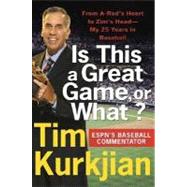
Note: Supplemental materials are not guaranteed with Rental or Used book purchases.
Purchase Benefits
What is included with this book?
| Introduction | p. 1 |
| My Mom Was My Catcher | p. 5 |
| Business...But It's a Pleasure | p. 21 |
| I'll Beat You Playing from My Knees | p. 39 |
| Phil Niekro's Teeth | p. 59 |
| I'm Old, I'm Fat, I'm Bald, Cm Ugly, I Have a Plate in My Head | p. 77 |
| My Face Was Crushed by a Bowling Ball Going 90 MPH | p. 97 |
| I Need It Now-Stat! | p. 119 |
| Signs, Signs, Everywhere a Sign | p. 137 |
| I'm Whacked | p. 149 |
| There Was a Blimp in Left Field | p. 167 |
| The Sun Will Rise, the Sun Will Set, and I'll Have Lunch | p. 179 |
| It's Ambidextrous, Not Amphibious | p. 191 |
| Angel, My Man | p. 201 |
| Why Can't There Be a Left-handed Catcher? | p. 217 |
| Just Grab That Bat as Tight as You Can, Son | p. 227 |
| I Love Ketchup | p. 239 |
| Acknowledgments | p. 257 |
| Table of Contents provided by Ingram. All Rights Reserved. |
The New copy of this book will include any supplemental materials advertised. Please check the title of the book to determine if it should include any access cards, study guides, lab manuals, CDs, etc.
The Used, Rental and eBook copies of this book are not guaranteed to include any supplemental materials. Typically, only the book itself is included. This is true even if the title states it includes any access cards, study guides, lab manuals, CDs, etc.
Excerpted from Is This a Great Game, or What?: From A-Rod's Heart to Zim's Head--My 25 Years in Baseball by Tim Kurkjian
All rights reserved by the original copyright owners. Excerpts are provided for display purposes only and may not be reproduced, reprinted or distributed without the written permission of the publisher.